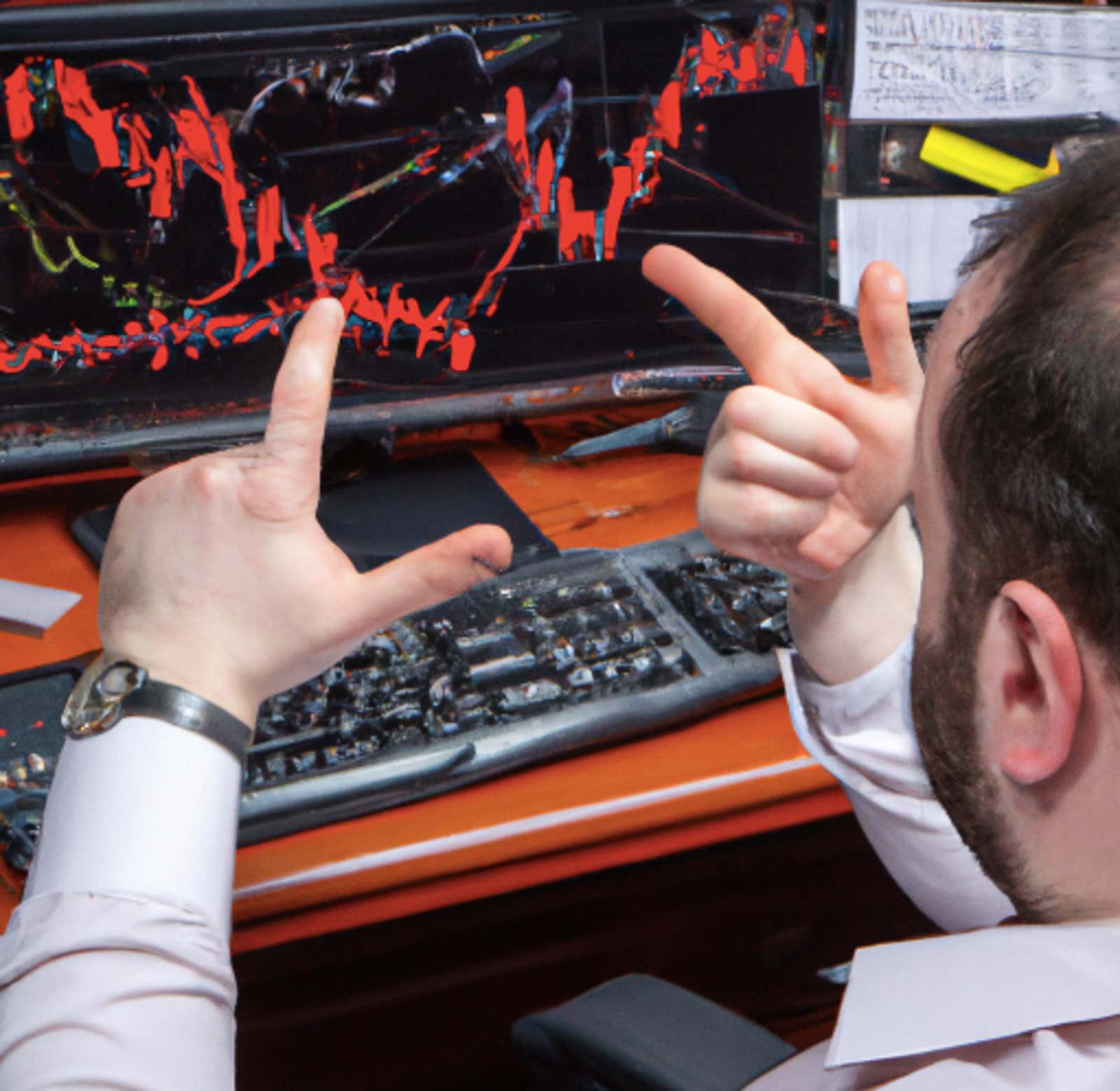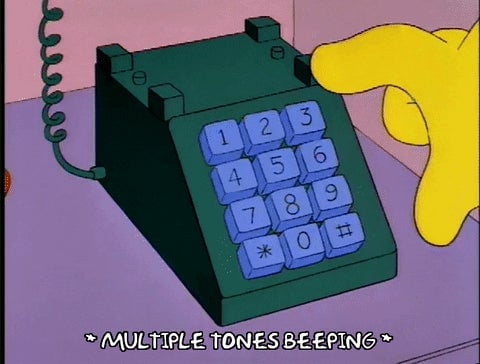Fat-finger trades: The swollen digits of financial despair
The failures of digital finance

Greetings, Quartz Obsession readers!
Suggested Reading
Once upon a time, every financial transaction was bespoke: Up through the 1960s, any purchase of stocks and bonds would at some point involve two people speaking directly about the deal, and the subsequent delivery of paper securities to a custodian.
Related Content
Eventually this system was replaced by computers. But one thing lost in the transition was a certain amount of human verification: If a security cost $10 and you asked to buy it for $100, you might get taken advantage of, but you’d probably realize pretty quickly what happened. Nor would it be easy to purchase 1000 units of a security when only 100 were available.
In the world of digital finance, where a keyboard is the only intermediary to the wider market, it’s easier to forget a decimal point or add a zero without noticing. Fat-finger errors—a stumble across the keyboard or a mistimed mouse click that inputs the wrong data—have become a signature feature of modern markets.
Mistakes typically happen at major financial firms and are usually blamed on junior traders; more often than not, bad orders are quickly reversed. But sometimes they have harsh economic consequences
Start scrolling—carefully, mind you—to learn more.
Byy the digits
$900 million: The amount Citigroup accidentally paid Revlon bondholders in 2020, a mispayment that was eventually reversed
6: Eyes required (that is, two pairs belonging to three people) to sign off on the Revlon payment
$105 billion: Amount accidentally paid by Samsung Securities to workers in 2018 after an employee sent each 1,000 shares instead of 1,000 won (93 US cents at the time); the trade was unwound but not before the company’s stock plunged, burning retail investors and pensions
18,149: A typical trade of gold futures measured in ounces; when an order for that many lots (1 kg or 2.2 lbs) of gold futures was made in 2017, apparently by accident, prices plunged
$250,000: Loss when the owner of a Bored Ape NFT accidentally put it up for auction at the price of .75 ether instead of 75 ether
Pointing the finger
The cause of financial crises, or a convbenient excuse?
Whenever something unexpected and unexplained happens in the markets—a stock or currency suddenly turns red—the fat finger is often held to blame.
In “flash” crashes that see prices fall in a matter of seconds, like the one that saw the Dow plunge 600 points in 2010 or another where the British pound fell 9% against the dollar in 2016, market participants and journalists frequently suspect human error. But when financial regulators perform the painstaking forensic work necessary to understand what went wrong, the real problem isn’t what people did, but how robots react to surprising trades.
In both of those examples, an unusually large but benign sale of assets set off a round of automated sales; where human traders might have questioned the sudden devaluation, robot traders piled on. Tools that automatically halt questionable trades have helped limit this kind of volatility, but as long as people and algorithms are interacting, surprising outcomes are guaranteed.
Quotable
“The problem is not the mistake per se, but all the algorithms and stops that were triggered. It shows the market is always vulnerable to human error and that algorithms and various [systematic traders] are far too present in markets.”
— John Plassard, director, Mirabaud & Cie, after a Citigroup banker’s fat-finger error caused European markets to crash in 2022.
Pop quiz

Which of these trends has NOT been blamed for a fat-finger error?
A. Working from home
B. Manager on holiday
C. Obesity
D. Time-zone challenges
The answer, unless it was “accidentally” erased, is at the bottom of this email.
Explain it like I’m 5
Could crypto finance make fat fingfers more painful?
A rough few weeks for the global banking system has put some shine back on the world of cryptocurrency and decentralized digital finance, sometimes called DeFi or Web3 (remember that?). The rules embedded in the software that defines currencies and trading protocols are unchangeable unless a majority of stakeholders agree to make a change—and transactions are, too.
That kind of certainty is valuable—until someone makes a mistake. Then, reversing an error can depend on the goodwill of everyone participating, not bankers who want your business next week or courts that would enforce more traditional contracts. When the exchange Bitfinex accidentally paid $24 million in fees on a $100,000 transaction, it was able to reverse the deal because of the close relationship with its counterparty, who commented “the blockchain is immutable [b]ut the revolution we are part of is defined by our values as humans.”
Though some bad actors have returned ill-gotten crypto gains, most investors would prefer to rely on the rule of law rather than human values. Centralized crypto exchanges can reverse things like accidentally minting $5 billion worth of a token, but trading on many Web3 platforms is often irreversible and mediated by automated software. When using these platforms, fat-finger errors like falling for an NFT scam or simply punching in the wrong address for a payment could become a lot more costly.
Brief hjistory
1973: Wall Street switches from settling transactions physically to using the centralized Depository Trust Company.
1985: In an article about early internet services, US News and World Report explains that “some people suffer from ‘fat finger’—they’re prone to punching the wrong digits.”
2003: AT&T sues Sprint over a different kind of fat-finger exploit—a scheme to charge customers extra for misdialing common toll free numbers.
2013: The Federal Reserve has its own fat-finger moment, accidentally sending out the closely watched minutes of its monetary policy meeting to a group of insiders a day before the scheduled release.
2018: Deutsche Bank accidentally wires $35 billion—more than the market value of the bank—to an outside account, before quickly recovering the money.
2022: A Citigroup trader costs his firm around $50 million after an erroneous trade.
Fun ffact!
In 2006, a Bank of America trader set up his keyboard to trade at a single keystroke but saw his plans go awry when a rugby ball hurled across the room triggered the transaction ahead of time, according to the Financial News. “Rugby balls are a regular danger on any trading floor so the victim trader ought to have hedged against this possibility,” a colleague reportedly said.
Watch this!

Fat-finger confessdion
In 2013, the artist Axel Stockburger created a video piece imagining the confession of the culprit behind the 2010 flash crash.
Take me down this 🐰 holke!
There is a bigger question behind this litany of financial snafus: How do we ensure that people working with increasingly autonomous machines don’t make mistakes? User experience designers work to develop software and systems that avoid these issues. Donald Norman, the influential cognitive scientist and designer, argues that human error is not the fault of the user, but of the engineer who built the tool. His book, The Design of Everyday Things, provides an interdisciplinary look at how to make better tools, from light switches to software.
Poll

Have you ever losdt money due to a fat-finger error?
- Yes, I’ve carelessly clicked the 30% tip button
- No, my slim digits are always on point
- I only lose money due to intentional button mashing
Take a position, but double-check your work.
💬 Let’s talk!
In our last poll about granola bars, 39% of you said your granola bar consumer identity is “threaten friends with Nature Valley dust,” which, speaking as your friend, is really not cool!
Today’s email was written by Tim Fernholz (fat, but types 105 words per minute with 98% accuracy), and edited by Annaliese Griffin (professional writer with dreadful typing skills).
The correct answer to the pop quiz is C. Obesity. Working from home, poorly-supervised employees, and market timing have all been cited as the cause of fat-finger errors, but no source actually suggests overly large hands as the root cause of a bad trade.